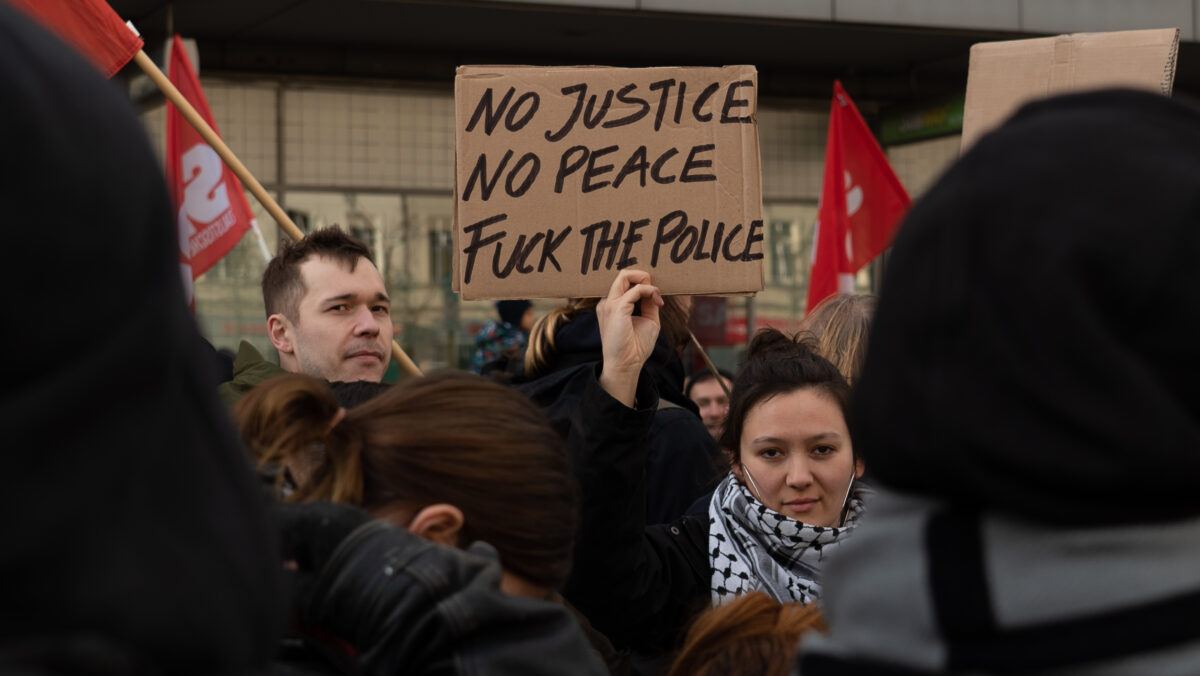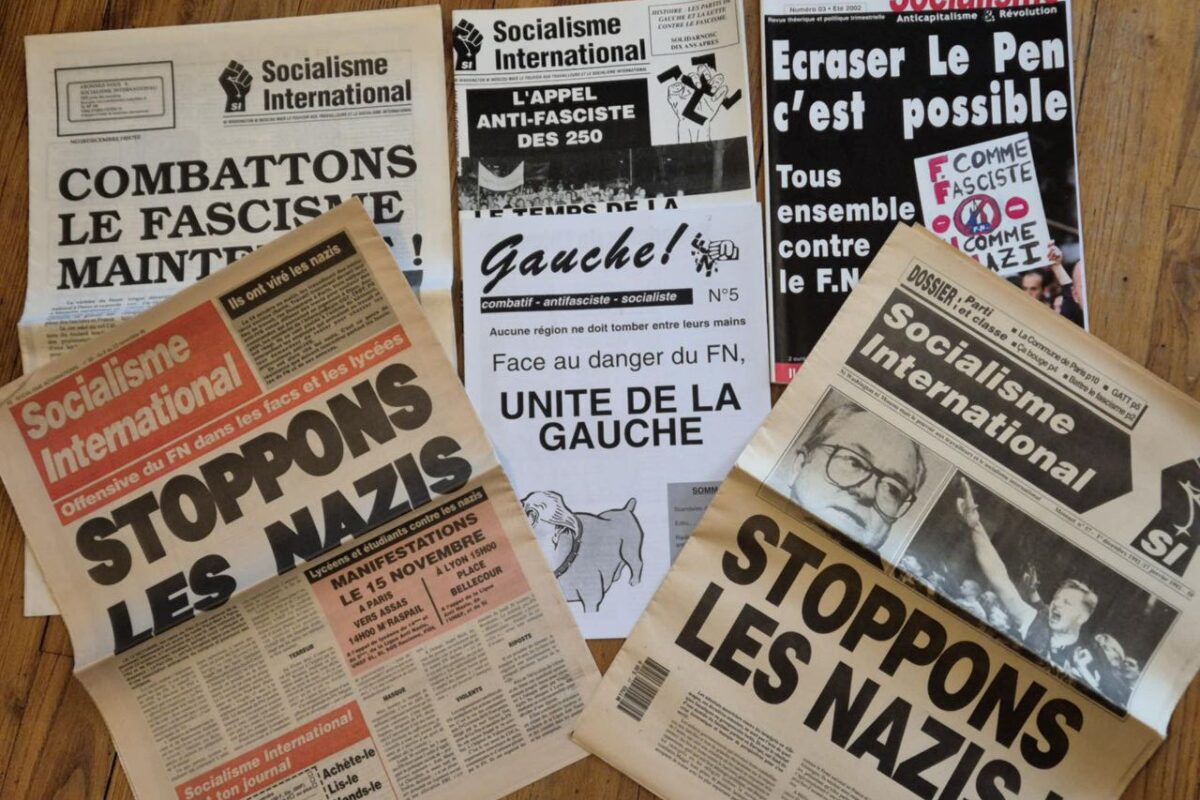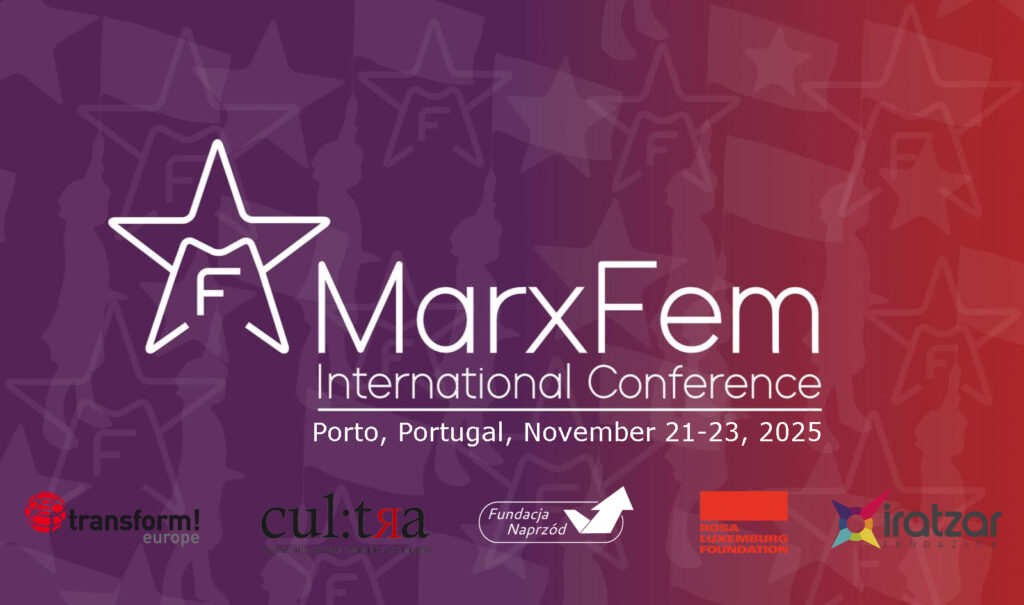As the German elections approach, each news cycle breaks new taboos. The far-right AfD is predicted to come in second with around 20% of the vote. The conservative CDU, meanwhile, is continuously plagiarizing from the AfD’s program: Friedrich Merz wants to revoke German citizenship from “criminals.” Not to be outdone, the Social Democrats and the Greens are talking about deporting people to Syria and doubling military spending, respectively. Sahra Wagenknecht is calling for more deportations, and even Die Linke is moving to the right, with the Left Party placing its hopes on three old reformist politicians who declare their unlimited solidarity with Israel’s genocide in Gaza.
This is the Rechtsruck, the German shift to the right. Slogans used by the fascist NPD (National democratic Party of Germany) just a decade ago are now points of agreement across the political spectrum.
Bucking the Trend
Revolutionary socialists are trying to stand up to the Rechtsruck. Inés Heider is a social worker. Or to be precise: After she was illegally fired from her job as a social workerwork for informing her colleagues about an anti-cuts rally, she started working as a teacher. Heider is running for the Bundestag in Friedrichshain-Kreuzberg as part of an independent socialist alliance. Franziska Thomas, another social worker, is running in Tempelhof-Schöneberg, while Leonie Lieb, a midwife at a hospital, is the candidate for Munich-West.
Defying the common sense of the German bourgeoisie and its political servants, these worker-candidates are calling for a world without borders, war, or exploitation. A 14-point program includes demands for the expropriation of companies that threaten to layoff workers; for blockades of weapons shipments to Israel; and for opening the borders.
While Germany’s bourgeois parties don’t care about people who have no right to vote — about a quarter of Berlin’s adult population! — a socialist campaign is not about maximizing votes. Instead, the point is to: educate, agitate, and organize. No passport is required to join this work. At open campaign meetings, held in German and also in English, people discuss collecting signatures and handing out fliers, but also mobilizing against the AfD party conference in Riesa this weekend.
The campaigns are getting a lot of positive feedback: people are relieved to hear there are candidates who don’t support Germany’s pro-genocide Staatsräson. These candidates are workers who don’t think politicians should earn more than nurses. If they get into the Bundestag, they don’t want the obscene salaries paid to the so-called “representatives of the people” (currently over €11,000 per month!). Instead, they would take a workers’ wage and donate the rest, about €9,000, to a strike fund.
This alliance was launched by two Trotskyist groups, the Revolutionary Internationalist Organization, publisher of Klasse Gegen Klasse, and the Revolutionary Socialist Organization. But this campaign is a proposal to the broader radical Left: During elections, when there is heightened interest in politics, we can agree on an anticapitalist platform based on class independence and class struggle, and throw ourselves into the debates.
Who Should Leftists Vote for?
In the last year, Die Linke has slowly collapsed, and we’ve seen an exodus of revolutionary socialist groups like Sozialismus von unten and Revolutionäre Linke from their ranks. The party bureaucracy has helped this process along, expelling the German-Palestinian activist Ramsis Kilani for his opposition to genocide. This is the context for The Left Berlin splitting away from Die Linke as well.
These splits actually present an opportunity for sincere leftists. For the last 15 years, many revolutionary socialists were embedded in Die Linke, forced to electioneer for “government socialists” who went on to take ministerial posts and carry out privatizations, deportations, and evictions. Leaving Die Linke is a first step — but we need to try to present ourselves to the masses as a political alternative to reformism.
With elections just six weeks away, who should socialists vote for? Some will hold their nose and vote for Die Linke anyway. But this won’t strengthen the Left — Die Linke’s support for neoliberal and pro-imperialist policies actually help the Far Right present itself as an “alternative.” Some will focus on a few actually left-wing candidates of Die Linke, such as Ferat Koçak in Neukölln. Ferat is an exemplary activist — but there is no overlooking the fact that he’s running for a party led by genocide supporters like Dietmar Bartsch and Bodo Ramelow.
There is also the new party Mera25, which is very popular among Palestine solidarity activists. For standing up to German support for genocide, that party has been subject to terrible defamation campaigns by the BILD newspaper, and they have our complete solidarity. Mera25 is not a socialist party, however. It is a party founded by a former finance minister of Greece, with a program of making Europe more social and more democratic via parliamentary reforms. This is, as Yanis Varoufakis’ time in office proved dramatically, a utopian and completely unrealistic program. Only an anticapitalist program offers a realistic chance of stopping the shift to the right.
This is I think why I think readers of The Left Berlin should support the socialist candidacies of Inés Heider, Franziska Thomas, and Leonie Lieb. These campaigns can be a contribution to making the anticapitalist and socialist Left visible in a time when all German parties are rapidly shifting to the right.




